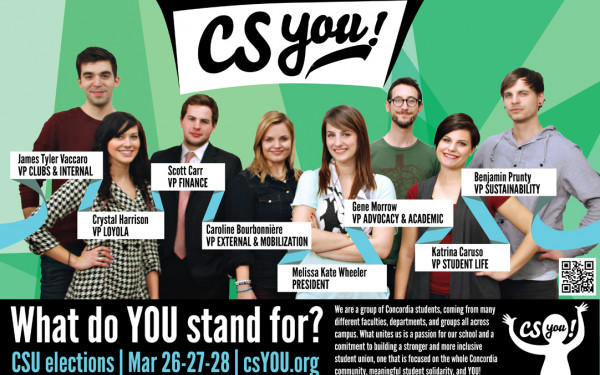The Great Slate Debate
While election season may be in full swing, the Concordia Student Union executive candidates have little to compete for, as VP Finance is the only one of the union’s paid representative jobs that’s contested.
Independent VP Finance candidate Pierre Tardivo-Martin is running against CSYou’s Scott Carr.
With VP Student Life hopeful Anja Rajaonarivelo forfeiting his candidature on Monday, the rest of the slate need only ensure quorum is met to secure their positions—representing over 35,000 Concordia undergrads.
Last year’s ballot set a precedent—in which executives were voted for individually and councillors could not be affiliated with a slate, the political teams candidates would campaign under.
“Politics at the CSU has historically been a blood sport,” said former CSU President Lex Gill, under whom the CSU electoral reform was passed. “To create a system where, even though you’re campaigning against each other, you may have to work together—[that] creates an environment with less antagonism, less dirty politics.”
With the 2012 election falling amid the student strikes, last year’s voter turnout was only about a quarter of what it had been the previous year.
With no political crisis on our hands this year, however, some are wondering if the lack of participation in the ongoing campaign comes courtesy of the two-year old electoral reform. Still, this year’s CSU executive doesn’t necessarily see that as a bad thing.
“It’s really about moving away from a system where you make your friends run for what you want them to do and then the students at large stay in the dark—and going towards a system where people feel they can actively participate in the CSU,” said current CSU VP External Simon-Pierre Lauzon of the reforms.
“That’s going to be difficult, and that’s going to take some time.”
“Politics at the CSU has historically been a blood sport. To create a system where, even though you’re campaigning against each other, you may have to work together—[that] creates an environment with less antagonism, less dirty politics.”
—Lex Gill, former CSU President, Current Board of Governors representative.
Reasons for Reform
The reforms were designed by previous CSU committees alongside Concordia professor and lawyer Patrice Blais, under former CSU president Heather Lucas.
After being finalized the following year, the bylaw changes were passed in a referendum ballot during the November 2011 byelections under then-CSU president Gill.
A revamping of the CSU’s electoral system meant that those seeking executive positions must run “individually” and councillors must run “individually and independently.”
When the question was put to a vote, an unofficial “No” campaign was started, arguing that removing the slate system would cause confusion for students come election season.
However, Gill argues having students not under the figurative whip sitting at CSU meetings establishes a much-needed accountability mechanism for the executive.
With the slate system, council could be theoretically filled with placeholders that could win under their party’s banner.
In some years, says Gill, councillors “would end up on council with the expectation they would vote for whatever the executive wanted.”
Still, questions have been raised about how these bylaw changes could be affecting this year’s election and the lack of candidates and contested positions.
However, many on the CSU agree with Gill.
“I think it’s too early to blame the new system on the lack of participation,” said Chad Walcott, current CSU councillor and former VP External under Gill. “I think we need to probably take a closer look at what the CSU has done to draw students out and make them interested in running in the first place.
“This system may have dropped in participation, but I think it has more to do with the two rough years that we’ve had,” he added.
“Fed Up With the CSU”
Student politicians seem to unanimously agree that the combination of last year’s polarizing student strike and this year’s CSU’s troubled track record have played a larger role in the lack of participation than anything else.
“Last year definitely didn’t leave students with the best taste in their mouths at Concordia—it was kind of outside our comfort zone,” said Walcott.
“And then you team it up with this year, where everything has gone to crap and students are a bit fed up with the CSU—I wouldn’t be surprised if that has more to do with it than the system itself.”
This year’s student union has been plagued by resignations, as well as infighting between and amongst councillors and the executive.
“This year has been a lot of drama on council, and there has been a lot of internal politics that has made it look really messy,” said recently elected CSU President Andrew Roberts. “I think the numbers have lowered just because of the amount of drama that’s been kicking up this year.”
The CSU’s chief electoral officer, Andre-Marcel Baril, pointed out that the CSU isn’t the only union seeing a lack of participation in student elections—the Arts and Science Federation of Associations executive only saw one contested position, and the Commerce and Administration Students’ Association only three.
The Fine Arts Student Alliance executive also only has one contested position in their upcoming elections.
“Student involvement and battling apathy in any audience is always going to be difficult,” said Roberts. “I guess it’s popping its head up a bit stronger this year, and it’s going to be a hard struggle for the executives coming into any association next year to have to fight against.”
Tuesday at 1:00 p.m., candidates will meet for the first round of debates at The Hive in the CC Building on the Loyola campus. The second round kicks off Wednesday at 4:00 p.m. on the seventh floor of the Hall Building in CSU lounge.

-01(WEB)_900_650_90.jpg)




_600_375_90_s_c1.jpg)